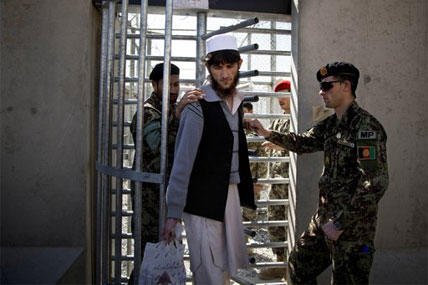Afghan authorities have taken the first steps towards releasing scores of prisoners -- including several accused of "insider attacks" on U.S. troops -- in a move that infuriated the U.S. military and widened the already deep rift between the White House and Afghan President Hamid Karzai.
"These are bad guys with blood on their hands," Army Col. Steve Warren, a Pentagon spokesman, said Monday. "We have formally disputed this release."
Warren and other Pentagon officials said the prisoners have not yet been set free, and they declined comment on whether the U.S. might seek to take them into custody again when they are.
A statement from the International Security Assistance Force in Kabul said that "this extra-judicial release of detainees is a major step backward in further developing the rule of law in Afghanistan."
The U.S. protests were aimed at the movement of 37 prisoners over the weekend from the Afghan section of the Parwan Detention Facility next to the Bagram Air Base to a holding area preparatory to release.
The prisoner transfer came as Marine Gen. Joseph Dunford, the ISAF commander, was meeting with President Obama at the White House on planning for a follow-on force of U.S. and NATO troops to remain in Afghanistan at the end of 2014, when all coalition combat forces are scheduled to withdraw.
The planned prisoner release has been cited by U.S. officials as a factor in holding up the signing of a new Bilateral Security Agreement with Afghanistan to allow as many as 10,000 U.S. troops to remain after 2014.
The prisoner issue came to a head earlier this month when Karzai announced that 88 prisoners from a group of more than 3,000 transferred from U.S. to Afghan custody were being considered for release.
A spokesman for Dunford said at the time that at least seven of the 88 detainees were suspected of "insider attacks" in which they wore the uniforms of Afghan police or soldiers to shoot and kill U.S. and coalition troops.
Pentagon officials said that at least 17 other detainees were believed responsible for planning improvised explosive devices, or roadside bombs, that caused casualties among coalition troops.
Aimal Faizi, a spokesman for Karzai, later said that a review of the 88 prisoners' cases by Afghan intelligence and judicial officials turned up no evidence of wrongdoing for 45 of the detainees, and there was insufficient evidence on another 27. Sixteen other detainees would remain in custody until their cases can be reviewed further, the spokesman said.
The criteria for selecting 37 detainees for movement to a holding area preparatory for release were not immediately known.
In a letter earlier this month to Defense Secretary Chuck Hagel, Rep. Howard "Buck" McKeon, R-Calif., chairman of the House Armed Services Committee, asked DoD to release the prisoners’ names and also include the prisoners’ "affiliation to any terrorist group and a brief description of their terrorist conduct."
"It is critical for the American people to know which dangerous detainees President Karzai intends to release and the threat they pose to the United States," McKeon wrote in the letter.
The named were not immediately disclosed, but HASC spokesmen said they expected the names to be turned over to the Committee eventually, if not released publicly.
Karzai has been warned repeatedly of the sensitivity of the prisoner issue. In a visit to Kabul earlier this month, Sens. John McCain, R-Ariz., Lindsey Graham, R-S.C., and John Barrasso, R-Wyo., told Karzai that the planned prisoner release threatened to scuttle talks on a new Bilateral Security Agreement.
"We don't want to see what happened in Iraq, where we won the war but lost the peace," McCain said.
"These people have blood on their hands. If the release goes ahead it will cause irreparable damage to our relationship," Graham said.




























